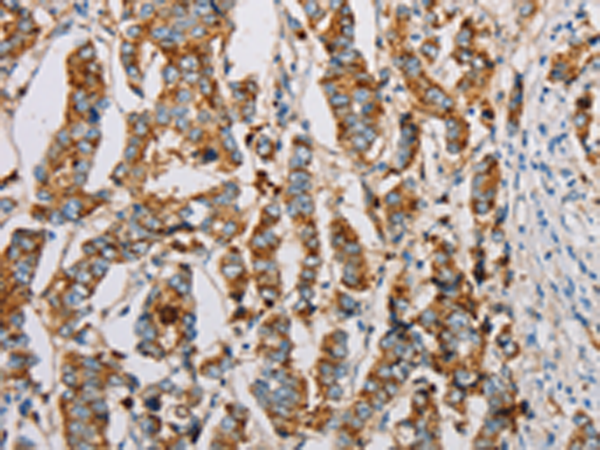


| WB | 咨询技术 | Human,Mouse,Rat |
| IF | 咨询技术 | Human,Mouse,Rat |
| IHC | 1/25-1/100 | Human,Mouse,Rat |
| ICC | 技术咨询 | Human,Mouse,Rat |
| FCM | 咨询技术 | Human,Mouse,Rat |
| Elisa | 1/2000-1/5000 | Human,Mouse,Rat |
| Aliases | 1-8U; IP15; DSPA2b |
| WB Predicted band size | 15 kDa |
| Host/Isotype | Rabbit IgG |
| Antibody Type | Primary antibody |
| Storage | Store at 4°C short term. Aliquot and store at -20°C long term. Avoid freeze/thaw cycles. |
| Species Reactivity | Human |
| Immunogen | Fusion protein of human IFITM3 |
| Formulation | Purified antibody in PBS with 0.05% sodium azide and 50% glycerol. |
+ +
以下是3篇关于IFITM3抗体的关键文献摘要:
1. **文献名称**:*The IFITM proteins mediate cellular resistance to influenza A virus*
**作者**:Brass, A.L. 等 (2009)
**摘要**:首次发现IFITM3蛋白能通过干扰病毒进入宿主细胞的早期阶段,显著抑制甲型流感病毒(IAV)的感染,揭示了其在固有免疫中的关键作用。
2. **文献名称**:*IFITM3 restricts influenza A virus entry by blocking the formation of fusion pores following virus–host hemifusion*
**作者**:Bailey, C.C. 等 (2014)
**摘要**:研究利用抗体标记和活细胞成像技术,证明IFITM3通过阻止病毒包膜与宿主细胞膜的融合孔形成,抑制流感病毒进入,阐明了其分子机制。
3. **文献名称**:*IFITM3 inhibits influenza A virus infection by preventing cytosolic entry*
**作者**:Desai, T.M. 等 (2014)
**摘要**:通过抗体标记和病毒追踪实验,发现IFITM3将流感病毒颗粒滞留在细胞内的晚期内体中,阻止其释放到细胞质,从而抑制病毒复制。
如需具体实验中使用IFITM3抗体的文献,可进一步补充方向信息。
The interferon-induced transmembrane protein 3 (IFITM3) is a key component of the innate immune system, known for its role in restricting viral infections. It inhibits the entry of diverse enveloped viruses, including influenza, dengue, Zika, and SARS-CoV-2. by altering membrane fluidity and preventing viral fusion with host cell membranes. IFITM3 antibodies are essential tools for studying its expression, localization, and function in viral pathogenesis and immune regulation.
These antibodies are widely used in techniques like Western blotting, immunofluorescence, and flow cytometry to detect IFITM3 in cell lines, tissues, or clinical samples. Research has linked IFITM3 to disease outcomes; for example, its upregulation is associated with reduced viral replication, while certain genetic variants (e.g., rs12252-C) correlate with increased severity of infections like influenza. IFITM3 antibodies also help explore its dual roles in cancer, where it may act as a tumor suppressor or promoter depending on context.
Additionally, IFITM3 antibodies contribute to therapeutic development, as modulating its activity could enhance antiviral responses or mitigate pathological overactivation. However, findings can vary due to cell-type-specific expression, post-translational modifications, or interactions with other host factors, underscoring the need for validated, high-specificity antibodies. Overall, IFITM3 antibodies are critical for unraveling its complex roles in infection, immunity, and disease.
×